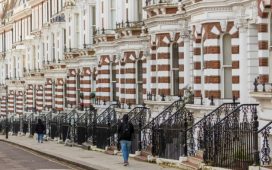In Austria’s picturesque Salzkammergut, a scandal has erupted over a luxury villa secretly bought by Russian oligarch and former Chelsea Football Club owner Roman Abramovich — and why sensitive official documents relating to the transaction may have been shredded.
Nearly two years into Russia’s full-scale invasion of Ukraine, the affair is shining an unflattering light on how Austria became a playground for Kremlin-connected billionaires, with some of Vladimir Putin’s most loyal lieutenants taking advantage of poor oversight and offshore structures to secretly acquire palatial properties across the country.
With sweeping EU sanctions now in force against many of the Russians, a handful of opposition Austrian politicians and campaigners are trying to expose — and in some cases oust — their unwanted guests.
In November, details of the mysterious purchase in 2007 of the ‘Fisherman’s House’ on the Fuschlsee — an emerald alpine lake just east of Salzburg — came to light in a massive leak of offshore documents from Cyprus.
They showed that the property’s buyer — a British woman whom locals believed to be an investment banker — was in fact a cut-out for Abramovich.
Abramovich was sanctioned by the EU in March 2022 for his “long and close ties” to the Russian president. The measures mean the 57-year old’s assets across the bloc have been frozen.
The Fisherman’s house, however, is currently owned by his daughter, Anna — who is not targeted by sanctions — who was “gifted” the villa in 2017.
The property’s modest name belies its value. Bought in a rundown state for €11mn 16 years ago, millions have since been spent on the cluster of wood and stone buildings, which date back to 1637.
Only the nearby Schloss Fuschl, a sprawling luxury hotel housed in a medieval fortress, has more waterfront.
Now the local Green party is campaigning to have the Fisherman’s House taken back — and believes it can do so, even though Anna Abramovich is not under sanctions, using the technicalities of local property law.
Green MPs have claimed in recent debates in the state parliament that laws that strictly regulate property sales to non-EU citizens, and that demand disclosure of ownership and usage, were circumvented when house was acquired. The law, they said, required the sale to be voided.
They have just one problem: the official documents from 2007, which detail what was said about the property’s owners, have been destroyed.
“The paper[s] may have been accidentally thrown away when the department moved,” said Martin Zauner, a far-right politician who is a member of the Salzburg regional coalition government and is responsible for property matters, to the astonishment of parliamentarians last month.
Zauner said he could not explain why no digital copies had been made.
Over the past two weeks, legal experts and opposition politicians have questioned the discrepancy and highlighted “mysterious” inconsistencies in the regional government’s subsequent explanations about why the files were shredded.
“The coincidence [of the files disappearing] has crooked optics,” local lawyer Lukas Hock told Der Standard newspaper. “I find it very strange.”

“We now know that the British woman who bought the house had never really been buying it for herself. She was lent the money by Abramovich’s trusts and she was only ever acting as his agent,” said Simon Heilig-Hofbauer, a local green MP. But he added, to take back the property, they needed to prove that misstatements were made on the record at the time.
“That’s where the problem begins. My wish would be that the whole sale of this property can be unwound.”
A spokesperson for Abramovich did not respond to a request for comment.
The Fisherman’s House was not even the most opulent property locally connected to sanctioned Russian oligarchs, Heilig-Hofbauer noted.
On the Attersee, another 10km east, is the Waldschlössl, a pocket palace that belongs to the former first deputy prime minister of Russia, Igor Shuvalov.
The well-connected politician was among the first Russians to be sanctioned by the EU immediately after the full-scale invasion of Ukraine. The EU says that as chair of the state development bank, VEB, Shuvalov plays a key role in directing funding to the Russian defence sector.
Technically the Shuvalov property on the Attersee is owned by a Liechtenstein trust, which Heilig-Hofbauer explains, exploits a quirk of Austrian property law. It is classed as an “EU” person, and therefore exempt from restrictions on ownership.
“Even Putin used to come and visit it,” said Heilig-Hofbauer.
This week, a fresh twist occurred that may finally reward campaigners’ efforts against Abramovich.
Addressing the state parliament on Wednesday, regional governor, Wilfried Haslauer, said that the destruction of the files had been a grave mistake.
But, he revealed, there may be a way to recover them. After an exhaustive search, his officials had determined that a paper copy may still be preserved in a regional town hall.
Parliamentarians say they expect to recover them in the coming days.
Additional reporting by Max Seddon in Riga











